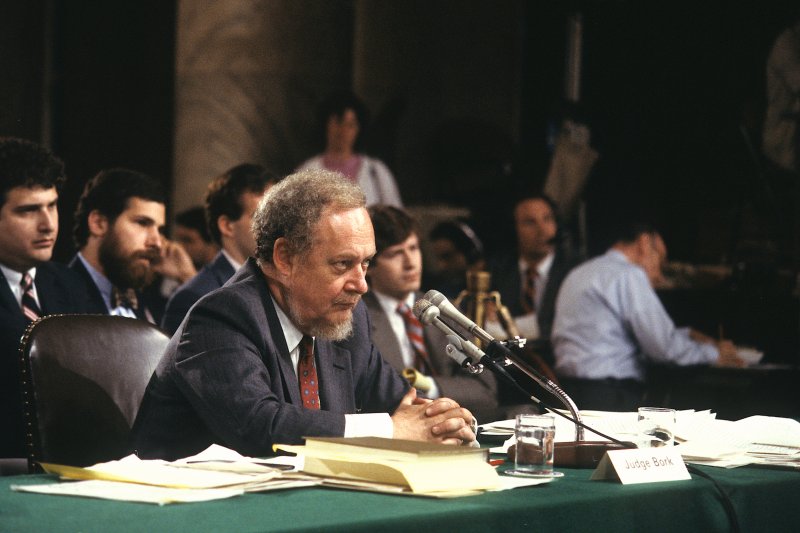|
Geoffrey Manne, ICLE president and Bork Foundation Advisory Board member, critiques House report on antitrust and Big Tech in The Hill.
1 Comment
Corporations, Antitrust & Securities Practice Group and The Bork Foundation Teleforum
Today’s Teleforum is cosponsored by The Bork Foundation, a non-partisan, nonprofit educational foundation just launched, led by Robert H. Bork, Jr. who chairs a board which includes today's speaker, George L. Priest, the Edward J. Phelps Professor of Law and Economics and Kauffman Distinguished Research Scholar in Law, Economics, and Entrepreneurship at Yale Law School. Rich Lowry writes in his column, Confirmation Hearings Shouldn’t be so Worthless (https://www.joplinglobe.com/opinion/columns/rich-lowry-confirmation-hearings-shouldnt-be-so-worthless/article_174e29ec-955e-540c-8294-4adbafb17af2.html) that Judge Bork was defeated because he was “acerbic and uncoachable.”
This is simply wrong. Judge Bork was defeated because:
As for being acerbic and uncoachable: If you mean acerbic as in sharp and forthright, well yes he was. He didn’t have a choice having written so much over so many years. Perhaps being pummeled for weeks by outrageous accusations that you allowed women to be sterilized, wanted to outlaw contraception, and ban blacks from lunch counters, you would be a bit testy, too. Uncoachable? How do you coach a man who doesn’t have a political bone in his body? He doesn’t think that way. What I think Mr. Lowry is saying without realizing it is that Judge Bork is honest and that it would have been better if he was not. He didn’t know how to dissemble like the panel sitting in front of him. So, respectfully, Mr. Lowry has bought into the revisionist wisdom (mostly promoted by libertarians and Democrats) about my father’s confirmation defeat that tries to blame him for his loss. I suggest that had he attempted to be like all the nominees for the Court that followed him, he would have been dishonest and still would have been defeated. Flashback: The Senate defeated Judge Bork's nomination to the Supreme Court on this date in 1987.10/23/2020
Fully aware of the pending outcome, he said this a few days before the vote in a statement at the White House:
"There should be a full debate and a final Senate decision. In deciding on this course, I harbor no illusions. But a crucial principle is at stake. That principle is the way we select the men and women who guard the liberties of all the American people. That should not be done through public campaigns of distortion. If I withdraw now, that campaign would be seen as a success, and it would be mounted against future nominees. For the sake of the Federal judiciary and the American people, that must not happen. The deliberative process must be restored." His full statement can be viewed here: By George L. Priest, Board Member, The Bork Foundation
The U.S. Justice Department and 11 states filed an antitrust claim against Google Tuesday alleging illegal monopolization. The lawsuit follows the release earlier this month of a voluminous report by the House Judiciary Committee arguing that the four major U.S. internet platforms—Google, Amazon, Apple and Facebook —are monopolies and ought to be broken up. The suit against Google is the first of what will likely be many antitrust attacks on these dominant platforms. The basic argument of the lawsuit is that Google possesses a monopoly over search engines and search advertising, which it maintains by entering agreements to make its search engine the default on many devices. This resembles one of the claims made 20 years ago against Microsoft’s Internet Explorer. Yet the argument rests on a misconception about the creation and operation of network industries, which will condemn this case—and future ones like it—to failure under sensible interpretations of U.S. antitrust laws. Initially, the big four platforms didn’t resemble monopolies traditionally prohibited under the antitrust laws. As the Justice Department and House Judiciary Committee admit, they are commercial platforms, built from the growth and development of network benefits, not monopolies created by the merger of former competitors solely to avoid competition and increase prices to consumers. John D. Rockefeller built the Standard Oil monopoly in the 1870s by cartelizing competing oil refineries, first in Cleveland, then across the country, eventually gaining a 90% market share in refining. This cartelization generated some efficiencies as smaller, less efficient refineries were closed down, but its principal effect was to reduce competition among refineries and increase their market power against the railroads. Similarly, J.P. Morgan and Andrew Carnegie succeeded in the cartelization by merger of previously independent and competing steel manufacturers to form U.S. Steel in 1901. The merger created a monopoly initially constituting two-thirds of steel ingot production. Both the oil-refining and steel monopolies were successively eroded over time by increased competition. The growth of the internet platforms was entirely different. They have developed internally by offering network benefits—the more people and organizations join, the more useful the network is for everyone. All of us benefit, consumers and sellers, when Google expands its search capabilities. Similarly, all connected to the internet benefit when Amazon expands the range of products it sells and ships. That is how the big four gained large market shares. By contrast, there were no similar network benefits from the aggregation of oil refineries or steel mills by single companies. While the Justice Department acknowledges the benefits from Google’s possession of scale in the operation of its search engines—according to the Justice Department’s complaint, “scale is of critical importance to competition among general search engines for consumers and search advertisers”—the lawsuit nonetheless attacks Google’s scale and the means it used to acquire it, such as revenue-sharing agreements with rival browsers. This internal contradiction—criticizing Google for achieving a scale that helps consumers and sellers—leaves the Justice Department in an awkward position. That is probably why many other state attorneys general, also hostile to Google and the other platforms, haven’t joined the suit. The complaint doesn’t demand a coherent remedy. The elimination of Microsoft’s similar restrictive agreements 20 years ago had no effect either on the success of Microsoft at the time or its inability today to compete with Google, but this complaint doesn’t even go there. It asks merely for “structural relief as needed,” as well as attorneys’ fees and costs. The Justice Department doesn’t show, in the slightest, a way to enhance consumer and seller benefit beyond the services provided by Google. WASHINGTON, D.C. – Robert H. Bork, Jr., responded to the filing today of an antitrust lawsuit against Google by the U.S. Department of Justice.
Robert H. Bork, Jr., Foundation President: “From its dramatic opening lines, to the breathless descriptions of Google’s size – such as italicizing ‘billions’ – DOJ’s filing often reads more like a political document than a legal analysis of genuine economic harms. “The filing acknowledges that consumers can easily change default settings from Google to Bing or DuckDuckGo. But, the document says ominously, ‘they rarely do.’ DOJ calls this ‘de facto’ exclusivity. Another way to put that is that millions of consumers are exercising their de jure right to the free service of their choice. “There are many other flaws in the logic of this document. For example, this filing conflates general search with product search. From DOJ’s language, you’d think Google is the Standard Oil of product searches. In fact, traditional search engines are a distant No. 2 when consumers begin product searches. “It is this kind of thumbing of the scales that gives this filing the feel of a political document. It is a series of charges that seem cobbled together to satisfy the grievances of politicians just before an election, not a thoughtful take on the future of search. “If the Department of Justice and attorneys general get their way, this filing will reshape business operations in ways that no lawyer is qualified to make. If so, we can expect unintended consequences for consumers that will be worse than anything in the complaint. “Turning innovation into litigation is bad news for actual users of social media and many small businesses. Let us hope the courts reintroduce a reality check and return to the only standard that counts – what is best for consumers.” The Bork Foundation is a nonpartisan, nonprofit organization with the mission of extending the legacy of the late Judge Robert H. Bork, scholar, jurist and public intellectual. It is not surprising in our cancel culture era that powerful politicians are waging a highly organized campaign to restructure social media companies in their own image, including imposing new restrictions on what can and cannot be posted online. The surprise is that in a national conversation dominated by Black Lives Matter and other social justice warriors, the most vociferous leaders of this movement to control private companies and online speech are conservatives.
On Thursday, the Republicans who control the Senate Commerce Committee subpoenaed the CEOs of Google, Twitter and Facebook to defend their legal immunity to manage content on their sites. Making Silicon Valley kingpins like Jack Dorsey (pictured above) sweat will no doubt give Republicans satisfaction. As a tactical matter, it may make sense to a vulnerable Senate majority to fire a shot across the bow of liberal companies just before an election. But the direction of travel, as the British like to say, is not good. |



 RSS Feed
RSS Feed